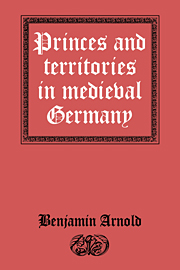Book contents
- Frontmatter
- Contents
- Acknowledgements
- List of abbreviations
- Introduction
- PART I CROWN AND PRINCE
- PART II PRINCELY TITLE AND OFFICE
- 4 The imperial house; German bishops and abbots
- 5 Dukes and duchies
- 6 Counts and the transformation of counties
- 7 Margraves, counts-palatine, burgraves, and landgraves
- PART III DYNASTIES, PRELATES, AND TERRITORIAL DOMINION
- Conclusion
- Index
5 - Dukes and duchies
Published online by Cambridge University Press: 03 December 2009
- Frontmatter
- Contents
- Acknowledgements
- List of abbreviations
- Introduction
- PART I CROWN AND PRINCE
- PART II PRINCELY TITLE AND OFFICE
- 4 The imperial house; German bishops and abbots
- 5 Dukes and duchies
- 6 Counts and the transformation of counties
- 7 Margraves, counts-palatine, burgraves, and landgraves
- PART III DYNASTIES, PRELATES, AND TERRITORIAL DOMINION
- Conclusion
- Index
Summary
Under the crown the highest secular title in the Empire restored in 962 was that of duke. Then, between 1098 and 1181 the number of ducal titles in the German kingdom more than doubled. In a few cases we possess valuable information about the jurisdictional powers which the royal court also confirmed to the new incumbents. This revision and extension of ducal titles and status provides positive evidence for the entrenchment of princely power in the German regions at a high level. But it is difficult to judge to what extent the twelfth-century titles represented a serious dilution of the ducal prestige so prominent in the sources of the eleventh century, or were making practical re-use of a title which had in any case lost much of its authority to the rising power of the Ottoman and Salian imperial dynasties. To put the question another way: were the twelfth-century dukedoms essentially a new jurisdiction under an old name, or did they convey some of the previous ducal powers into the era of incipient territorial consolidation?
In the thirteenth century ducal jurisdictions did not differ markedly in content or application from those of margraves, landgraves, bishops, and the more prominent counts, so that in the anatomy of territorial authority the twenty or so dukes are not easy to differentiate, except by title, from over a hundred principes imperii. If this is right, then the twelfth-century duchy was new and ‘territorial’ in scope, but the chronology is not quite clear-cut.
- Type
- Chapter
- Information
- Princes and Territories in Medieval Germany , pp. 88 - 111Publisher: Cambridge University PressPrint publication year: 1991



